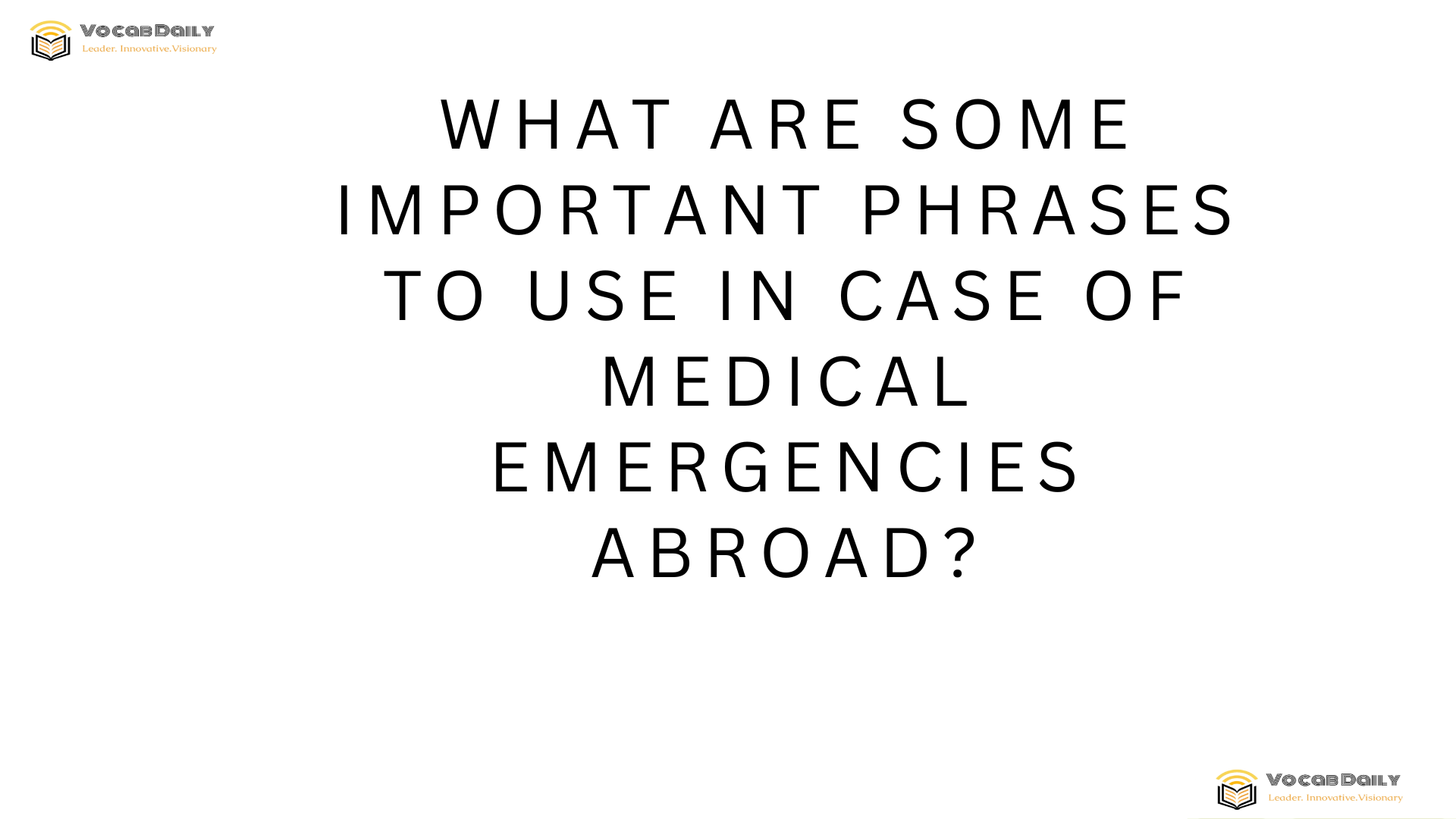What are some important phrases to use in case of medical emergencies abroad
Essential Emergency Phrases for Medical Situations
When traveling abroad, encountering a medical emergency can be a frightening experience. Language barriers may complicate the situation, so knowing some essential phrases can make a huge difference in obtaining prompt medical assistance. Whether it’s calling for help, explaining symptoms, or understanding prescriptions, being prepared with the right vocabulary is crucial for your safety and peace of mind.
How to Call for Help
In many countries, dialing the emergency number is your first step. In Europe, for example, dialing 112 gets you emergency services, while in the US and Canada, 911 is standard. Here are important phrases to use when calling for help:
- “I need an ambulance.” – Communicate the urgency that a medical vehicle must come immediately.
- “There is a medical emergency.” – Clearly state the nature of the situation.
- “Please send a doctor.” – Request professional medical assistance.
- “I don’t speak the language well.” – Let responders know that you may need help understanding.
- “Please speak slowly.” – Useful when trying to understand instructions over the phone.
Describing Symptoms Clearly
When you reach medical personnel or emergency responders, being able to describe symptoms accurately can help them provide the appropriate treatment faster. The following phrases can be lifesaving:
- “I feel pain here.” – Point to the exact area, such as “I feel pain in my chest.”
- “I am feeling dizzy.” – To explain lightheadedness or imbalance.
- “I am having trouble breathing.” – Critical when respiratory issues are involved.
- “I am bleeding.” – Important for injuries with blood loss.
- “The pain is sharp/dull/throbbing.” – Helps specify the kind of pain.
- “I lost consciousness.” – Useful if someone passed out or fainted.
- “I have nausea and vomiting.” – Indicates digestive issues or poisoning.
Expressing Allergies and Medical History
Medical personnel need to know your allergies, pre-existing conditions, and medications you are taking to avoid complications. Learning these phrases is key:
- “I am allergic to [medicine/food].” – For instance, “I am allergic to penicillin.”
- “I have asthma.” – To explain a chronic respiratory condition.
- “I am diabetic.” – Indicates a serious and ongoing health condition.
- “I take medication for [condition].” – Example: “I take medication for high blood pressure.”
- “I have had surgery before.” – Important for hospitals to know your medical background.
- “Do you speak English?” – Useful to find out if communication is possible without an interpreter.
Useful Questions to Ask Medical Staff
If you need clarification or instructions from healthcare providers, the following questions will help you understand your situation better:
- “What is my diagnosis?” – To learn about your medical condition.
- “What treatment do I need?” – To understand the next steps.
- “Are there any side effects?” – Important to know about medications.
- “How long will recovery take?” – Helps set expectations.
- “Can I take the medication with food?” – For proper administration of medicine.
- “Should I rest or can I move?” – Guidance on activity level after treatment.
Emergency Vocabulary for Medication and Allergies
Understanding basic medical terms related to medicine, allergies, and treatments helps you communicate effectively:
- Allergic reaction
- Prescription
- Dosage
- Side effects
- Antibiotics
- Painkiller
- Injection
- Tablet/pill
- Pharmacy
- Symptoms
- Emergency room
- Ambulance
Example Phrases for Use in Specific Emergencies
Below are some practical phrases you can memorize and adjust during an emergency situation abroad.
- “My friend collapsed; please send help.” – To report unconsciousness of another person.
- “I swallowed something harmful.” – Useful in poisoning scenarios.
- “I broke my arm.” – Clearly state the type of injury.
- “I have a fever and chills.” – Signs of infection.
- “I feel numbness in my legs.” – Indicates possible nerve issues.
- “There is an injury with heavy bleeding.” – To emphasize an urgent wound.
Importance of Non-Verbal Communication
Sometimes language is a barrier despite the best preparation. In these cases, non-verbal communication becomes essential. Using gestures such as pointing to painful areas, showing the injured part, or signaling distress can help healthcare workers understand your condition quicker. Carrying copies of important medical information like allergies, chronic diseases, and medications in the local language or in English will also aid responders.
Preparing for Medical Emergencies Before Traveling
Before you even set foot abroad, prepare a small emergency phrase list tailored to your destination’s language. Travel apps, phrasebooks, or language learning websites are helpful tools. Consider including phrases relevant to your health conditions and common medical scenarios. Also, research local emergency numbers, hospital locations, and availability of English-speaking doctors. Carry your health insurance policy and emergency contact details with you at all times.
Cultural Tips When Seeking Medical Help
Understanding cultural norms can also be important during medical emergencies. In some cultures, direct eye contact or speaking loudly might be viewed as rude, while in others it may convey urgency effectively. Be polite but firm about your needs. Learning how to say “thank you” and ask for assistance politely in the local language can help foster goodwill and smoother communication.
Also check out VocabDaily workbook collections.

Leave a Reply